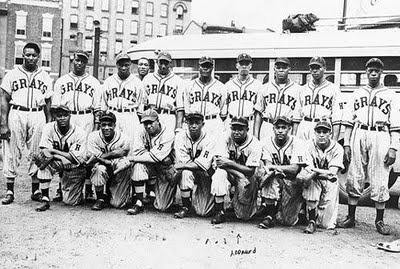What Locked-Out NBA Players Can Learn from the Negro Baseball Leagues

What Locked-Out NBA Players Can Learn from the Negro Baseball Leagues by Mark Anthony Neal | The Atlanta Post
Deron Williams' recent announcement that he was planning to play abroad during the NBA lockout with the possibility that many other NBA stars are also considering doing so, highlights the successful globalization of the NBA; it is one of the world's most recognizable brands. But as David J. Leonard recently suggested, "Whereas the NBA hoped to cultivate and capitalize on stars from China, Germany, France, Brazil and elsewhere," and market them to global fans, "it has been African American stars that have captured the hearts and minds of many global fans." Leonard notes, the NBA's desire for expansion has unwittingly given the leagues' players—80% of whom are of African-descent—bargaining leverage in the midst of an owners' lock-out.
NBA players have long been in a unique position; with regards to the NBA. the players exist as both the labor and the product, and despite the escalation of players' salaries in comparison to a generation ago, their labors have primarily increased the coffers of the league's owners. In contrast to their capacity to generate wealth for the owners and commissioner David Stern (whose job is to advocate on behalf of the owners), the players themselves have very little input in the basic affairs of the league (i.e. salary-caps, dress codes, minimum age limits, etc).
Given their role as the NBA's primary commodity, the question is not whether NBA players should play in Europe or elsewhere during the lockout, but whether the players should think about creating a professional league of their own that would maximize their labor, economic value and provide a legitimate alternative to the NBA. If the players were to look for a model, there is no better one than the Negro Baseball League.
When Moses Fleetwood was released by the Syracuse baseball team in 1889, he became a historic footnote: the last African-American to play in Major League Baseball until Jackie Robinson broke through the so-called "color line" in the spring of 1947. Fleetwood and many Black players until Robinson were subject to an unspoken decision by a cabal of Major League owners and players to ban Black players from the league. In effect the owners locked-out some of the best American baseball players of the early 20th century.
Read the Full Essay @ The Atlanta Post
Published on July 21, 2011 20:27
No comments have been added yet.
Mark Anthony Neal's Blog
- Mark Anthony Neal's profile
- 30 followers
Mark Anthony Neal isn't a Goodreads Author
(yet),
but they
do have a blog,
so here are some recent posts imported from
their feed.



